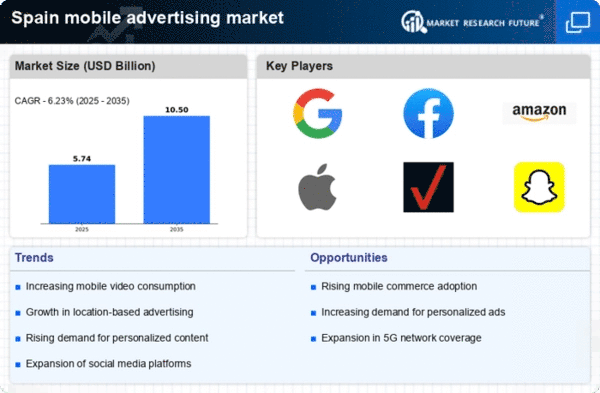Growing E-commerce Adoption
The rise of e-commerce in Spain is significantly impacting the mobile advertising market. With online shopping becoming increasingly popular, mobile devices serve as essential tools for consumers to browse and purchase products. In 2025, e-commerce sales in Spain are projected to reach €50 billion, with a substantial portion of these transactions occurring via mobile devices. This trend suggests that advertisers may need to focus on mobile-optimized campaigns to capture the attention of potential buyers. The mobile advertising market is likely to evolve as brands invest in mobile-friendly websites and applications, enhancing the overall shopping experience for consumers and driving sales through targeted advertising.
Rising Smartphone Penetration
The mobile advertising market in Spain is experiencing a notable surge due to the increasing penetration of smartphones. As of 2025, approximately 85% of the Spanish population owns a smartphone, which facilitates access to mobile advertising platforms. This widespread adoption enables advertisers to reach a larger audience effectively. The mobile advertising market is likely to benefit from this trend, as more users engage with mobile content. Furthermore, the average time spent on mobile devices has risen to about 4 hours daily, indicating a shift in consumer behavior towards mobile engagement. This growing reliance on smartphones suggests that advertisers may need to adapt their strategies to capture the attention of this expanding user base.
Advancements in Mobile Technology
Technological advancements play a crucial role in shaping the mobile advertising market in Spain. The introduction of 5G technology is expected to enhance mobile internet speeds significantly, allowing for richer and more interactive advertising experiences. As of November 2025, 5G coverage in Spain has reached approximately 60%, enabling advertisers to leverage high-quality video and augmented reality content. This technological evolution may lead to increased consumer engagement and higher conversion rates. Additionally, the mobile advertising market is likely to see a rise in programmatic advertising, as automated systems become more sophisticated, allowing for targeted ad placements based on user behavior and preferences.
Regulatory Changes and Data Privacy
Regulatory changes regarding data privacy are shaping the mobile advertising market in Spain. With the implementation of stricter data protection laws, advertisers must navigate new compliance requirements while still delivering effective campaigns. As of November 2025, the General Data Protection Regulation (GDPR) continues to influence how companies collect and utilize consumer data. This regulatory environment may lead to a shift towards more transparent advertising practices, where user consent is prioritized. The mobile advertising market is likely to adapt by developing strategies that respect consumer privacy while still achieving marketing objectives. This balance between compliance and effective advertising could redefine how brands engage with their audiences.
Increased Investment in Digital Marketing
Investment in digital marketing continues to grow in Spain, positively influencing the mobile advertising market. As businesses recognize the importance of online presence, spending on digital advertising is expected to reach €4 billion in 2025, with mobile advertising accounting for a significant share. This shift indicates that companies are prioritizing mobile platforms to engage consumers effectively. The mobile advertising market may see a diversification of ad formats, including native ads and interactive content, as brands seek innovative ways to connect with their audience. This increased investment suggests a competitive landscape where advertisers must continually adapt to changing consumer preferences.
















